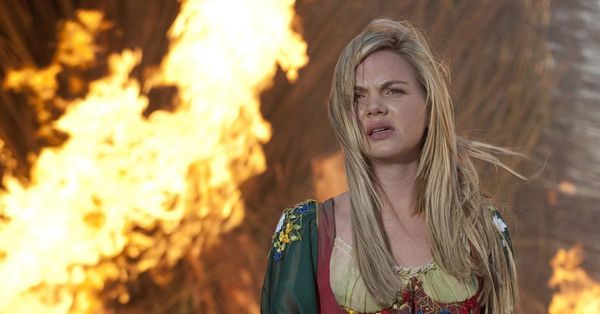Eye For Film >> Movies >> The Wicker Tree (2010) Film Review
The Wicker Tree
Reviewed by: Jennie Kermode

How does one follow on from a classic after 30 years? Few British films have enjoyed the influence and iconic status of The Wicker Man, so the idea of director Robin Hardy finally returning to this subject will thrill many fans whilst others will be quaking in their boots. Hardy himself has said that it was difficult to compete with the might of his earlier creation. Did he succeed?
The Wicker Tree isn't exactly a sequel, but it follows on in, shall we say, the same tradition, with a cameo from Christopher Lee suggesting that the cult featured in the original has spread outward from Summerisle. This time we are in the Scottish borders, where two young American evangelists hope they can convert the heathens and show them the way of Jesus. Full of light and energy, young singer Beth (Brittania Nicol) and her adoring cowboy fiance Steve (Henry Garret) are confident of the power in the message they bring, but they're a long way from home. Out of earshot, the locals discuss what a triumph it is to have found these two. Both try to be friendly toward the pagan traditions they hope to supplant, finding them quaint and charming, so Beth is delighted when she is asked to be Queen of the May, Steve thrilled by the chance of participating in a horse race as her Laddie.

Of course, all is not as it seems to the wide-eyed Texas ingenues. There's little point in trying to hide from viewers a secret most will already be familiar with, so instead the script plays around with black humour and makes much of the culture clash at its heart. Rather less prim than Edward Woodward's Calvinist policeman, Steve is surprisingly able to take command in a hostile bar, and he soon succumbs to the temptations of a more earthy life. But this time the trap is subtly different, and looked at in retrospect, his actions mark out a clear course to his downfall.
Sadly, this film lacks the tight plotting of the original. There's no smooth logical sequence to carry us through, with some scenes functioning as little more than padding. The film is also let down by some weak supporting performances, too heavy-handed and knowing to let viewers suspend disbelief. On the plus side, this lets the performances of the young stars shine, and the essential lack of sophistication of their characters is all the more glaring.
Beth's utter confusion when she finally realises what's going on is striking. Her response seems to be based more on what she has learned from movies that on what she has learned from God or common sense. The artificiality of her surroundings is at this point entirely appropriate; her inability to believe in what's happening highlights the deeper clash of civilisations that Hardy has been aiming to explore.
Although this is a flawed film, it certainly isn't the disaster many had feared, and it will provide viewers with much to think about. Perhaps most striking are the parallels between religious rituals that belie a deeper difference in how the characters view the world. The contrast of Old World and New, rendered geographically, neatly parallels the disconnect between Britain's professed religious leanings and the Pagan traditions that still linger everywhere, just as it parallels that between Beth's carefully cultivated sweet and holy personality and certain secrets in her past. Whilst it doesn't have the weight to answer its predecessor alone, it will leave many viewers looking forward to the promised final part of the trilogy.
Reviewed on: 27 Aug 2011


















